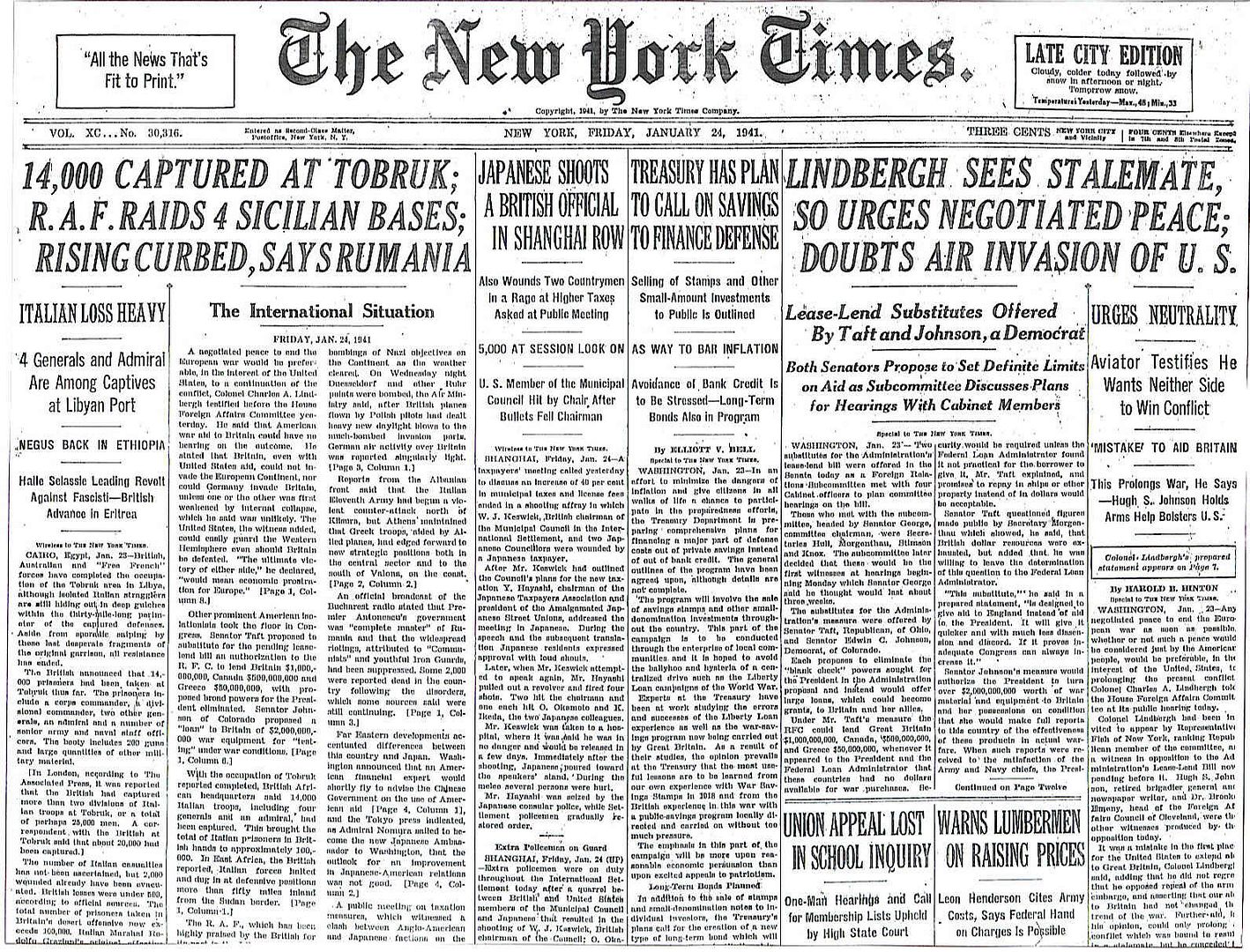
Posted on 01/24/2011 4:36:42 AM PST by Homer_J_Simpson

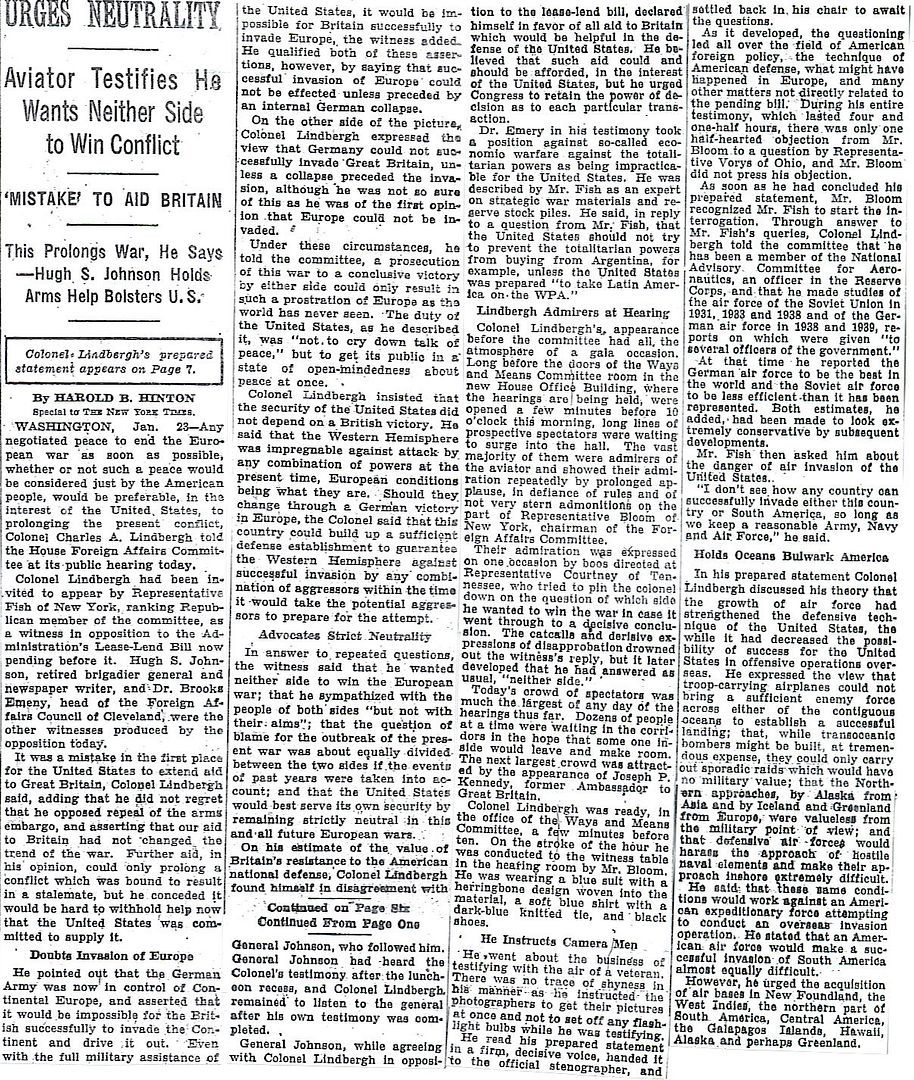
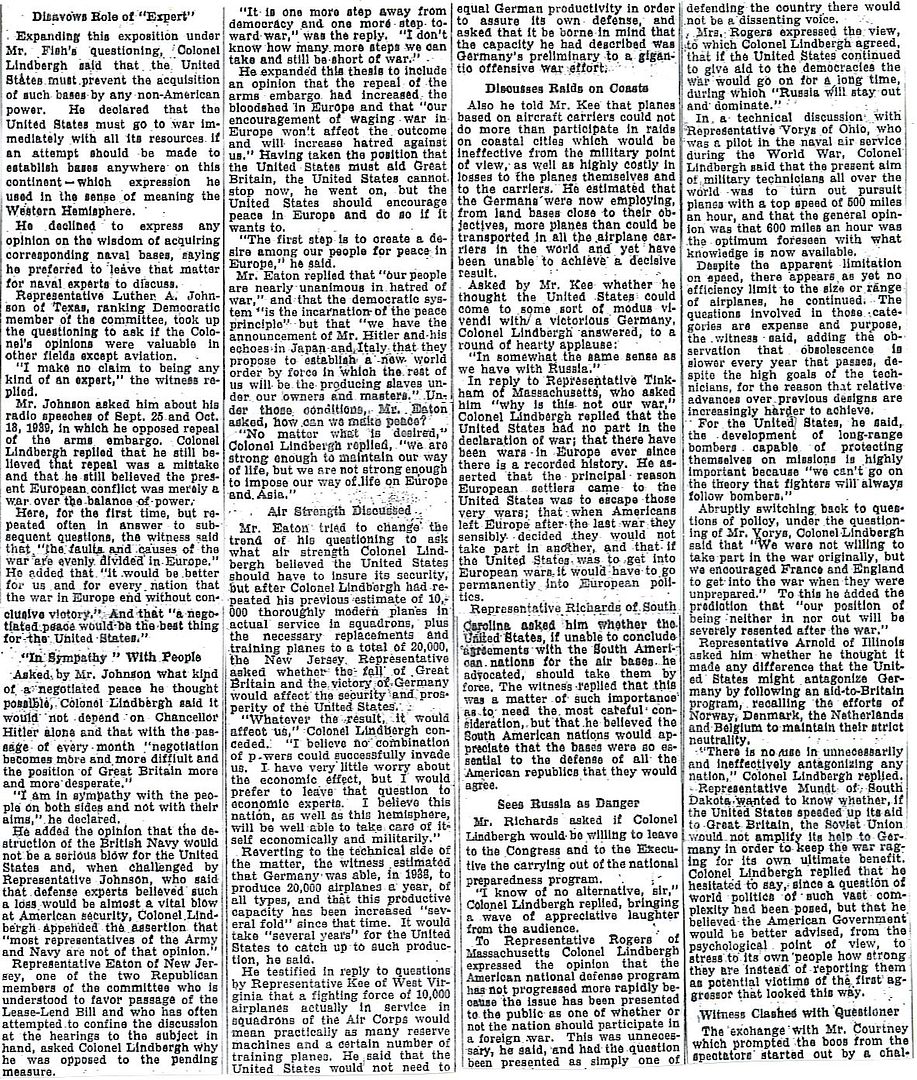
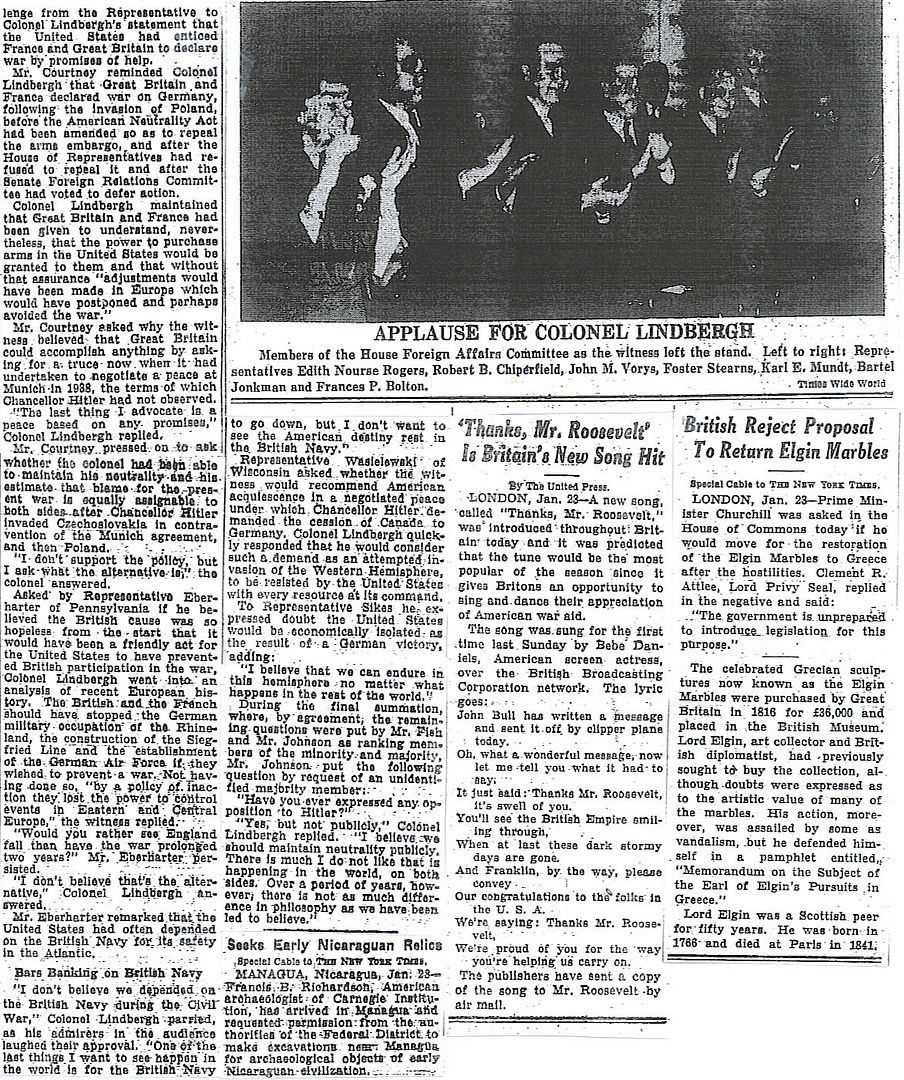
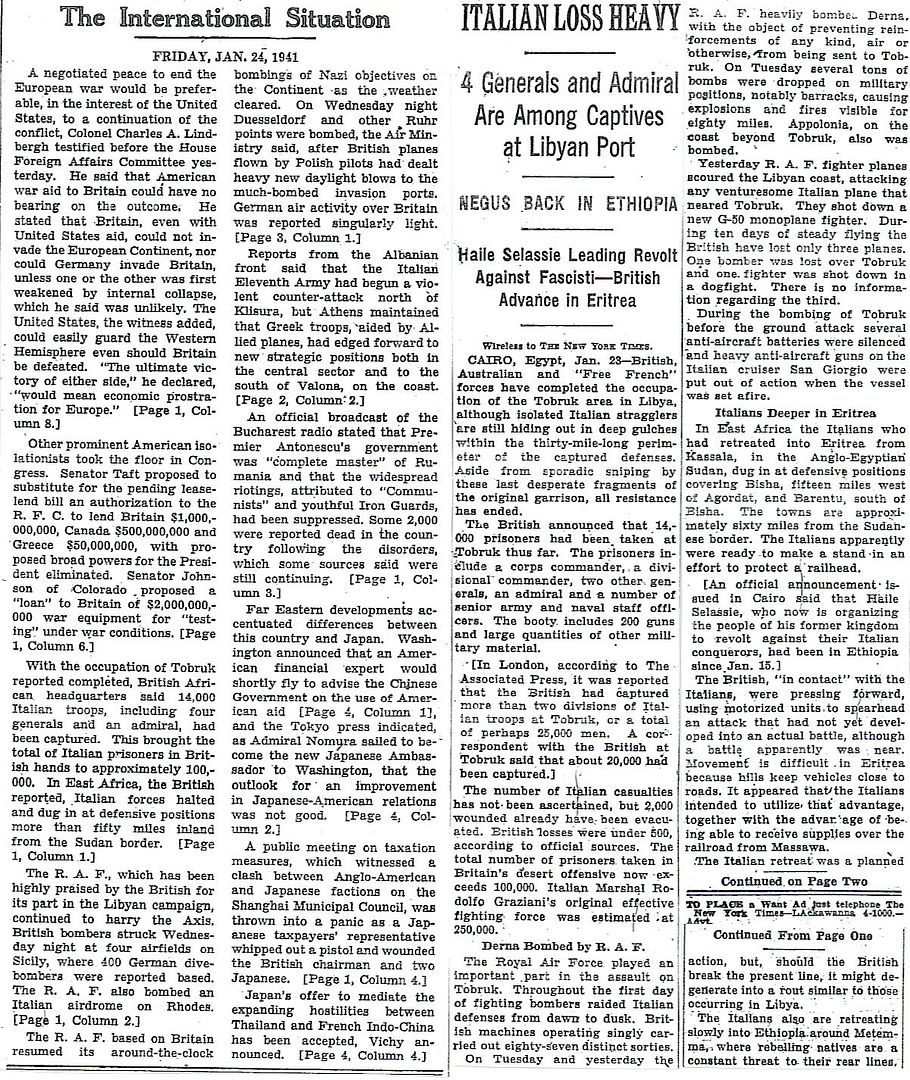
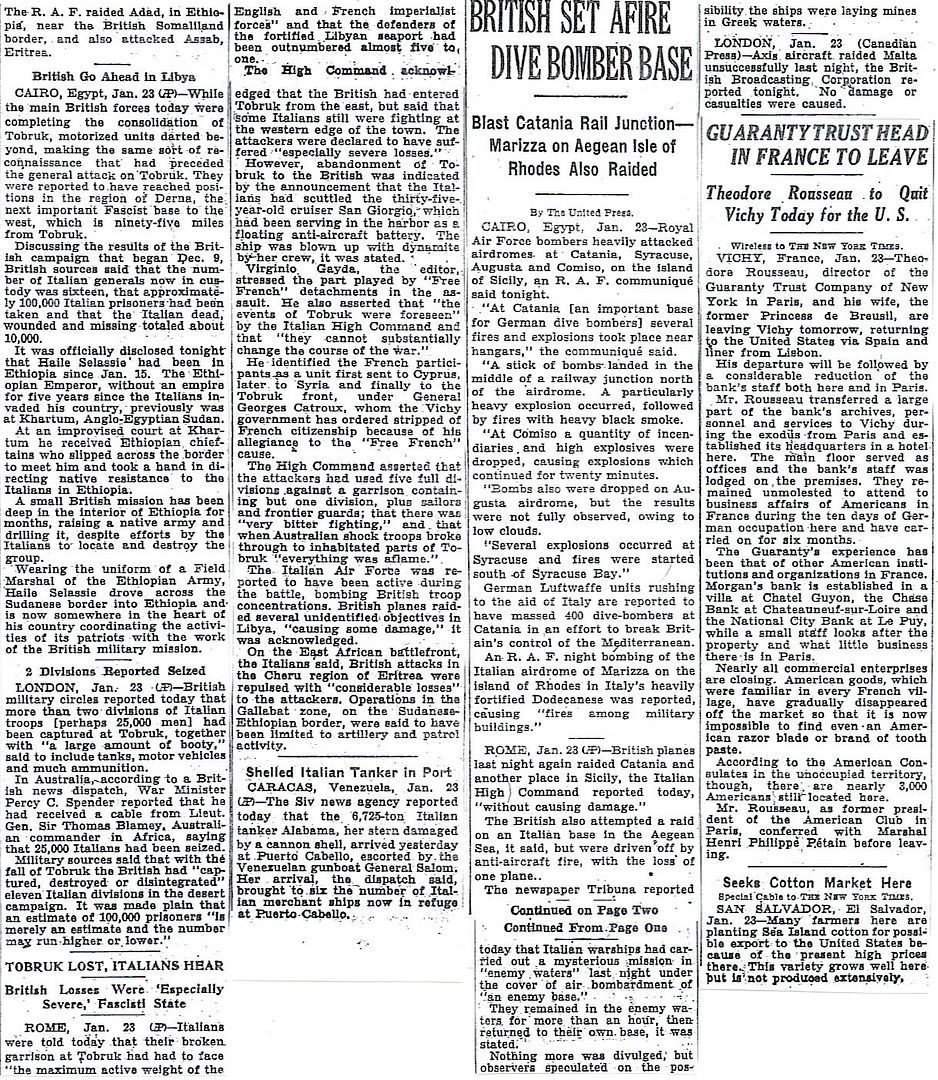
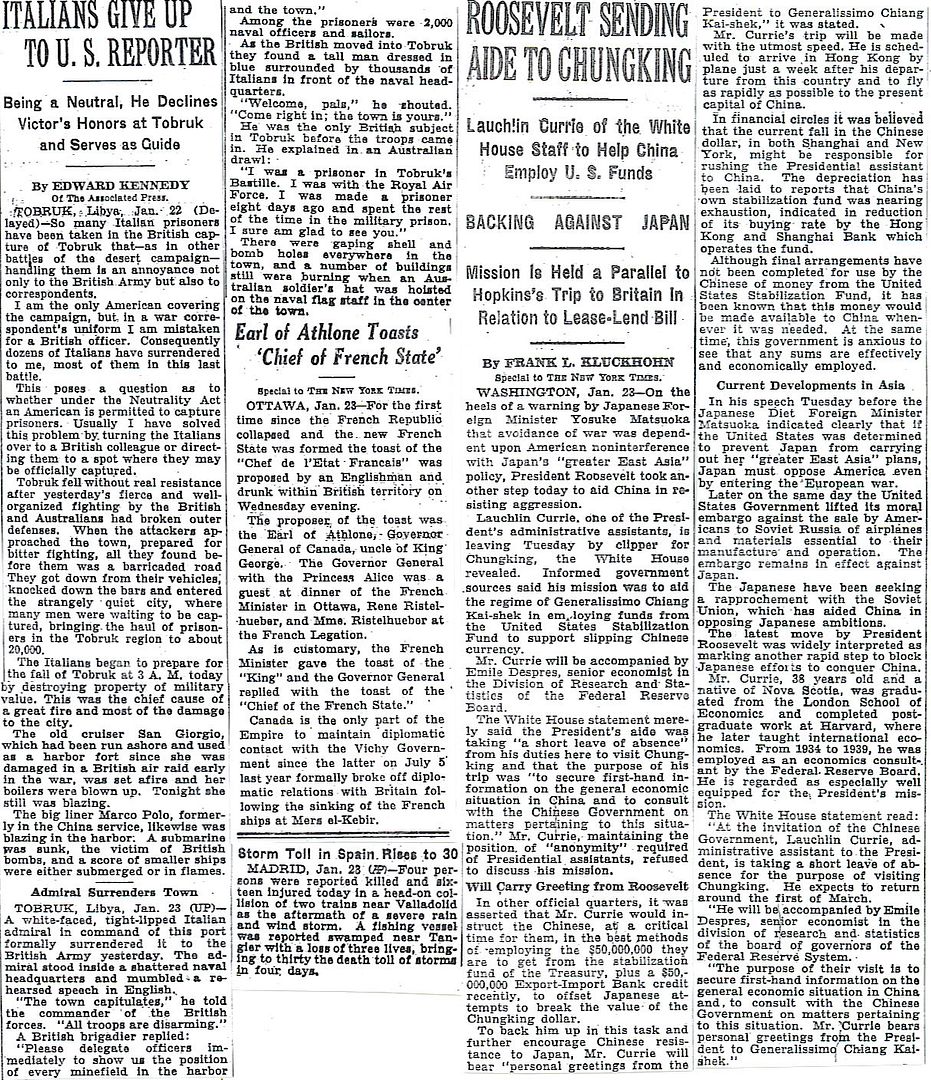
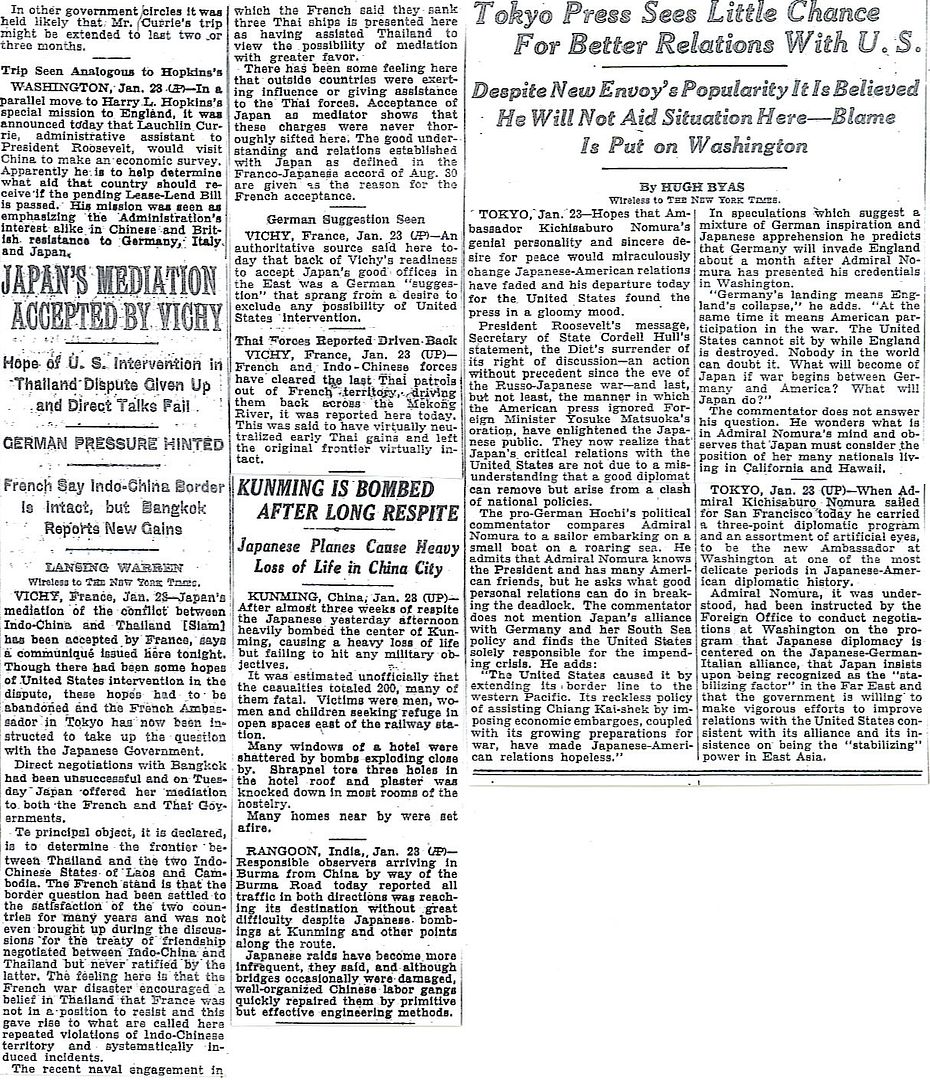
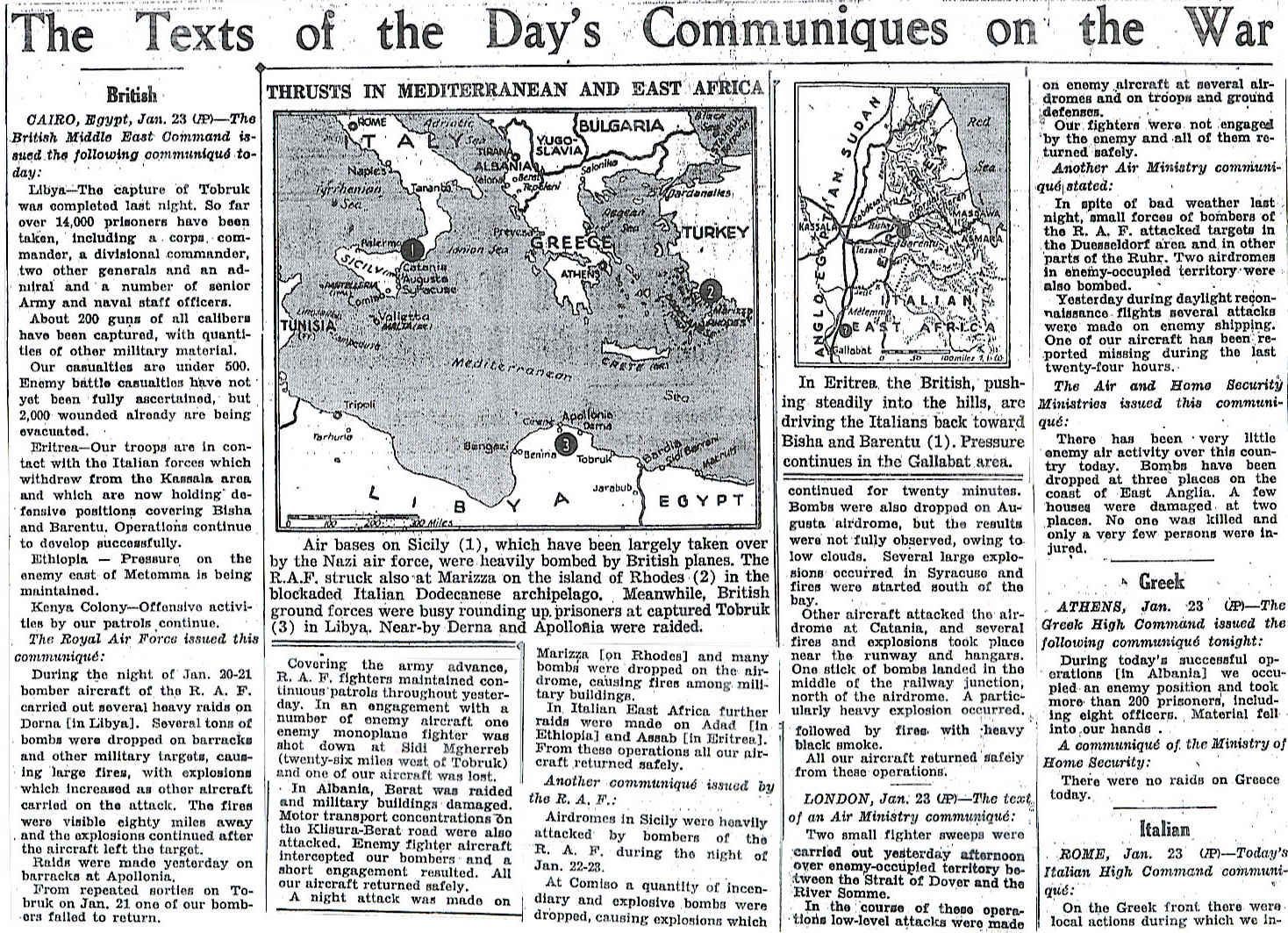
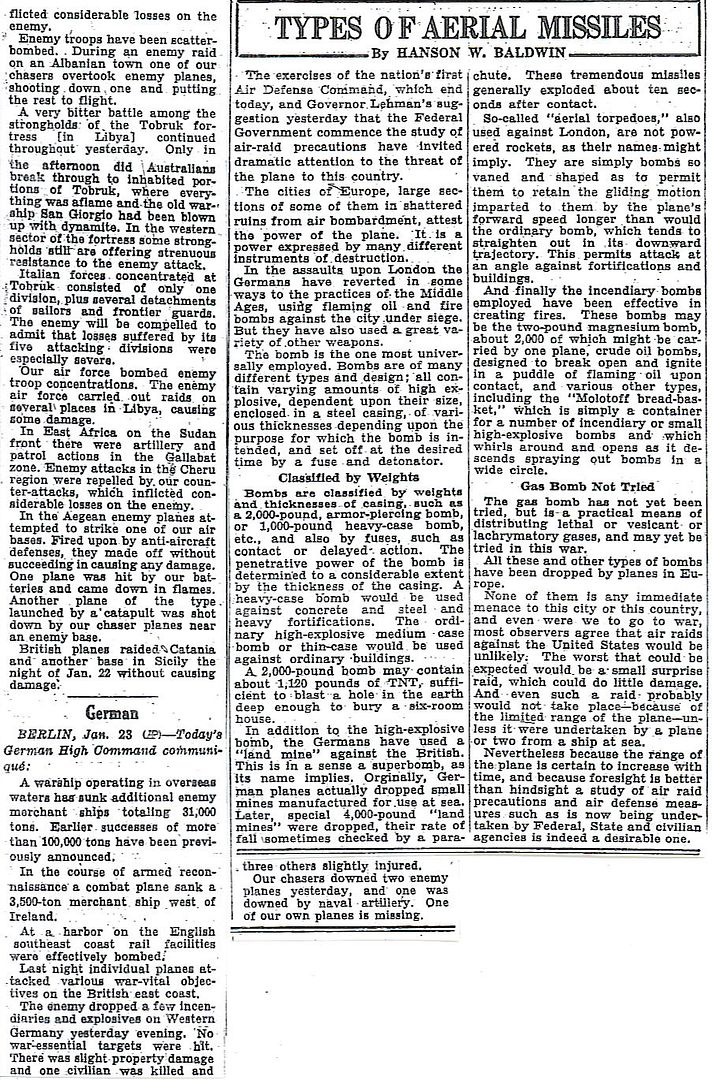
http://www.onwar.com/chrono/1941/jan41/f24jan41.htm
Italians losing in North Africa
Friday, January 24, 1941 www.onwar.com
In North Africa... There is a brief tank engagement near Mechili. The British 4th Armored Brigade and the Italian force suffer about equal losses before the Italians retire. The Italian forces in Libya are now split, with one group around Mechili and one on the coast at Derna. These positions do not give each other any support. The 19th Australian Brigade is moving on Derna while Mechili is to be encircled by 4th and 7th Armored Brigades.
http://homepage.ntlworld.com/andrew.etherington/month/thismonth/24.htm
January 24th, 1941
UNITED KINGDOM: The Chiefs of Staff ask Wavell to plan for a possible invasion of Sicily in the event of “dissension” between Italy and Germany.
GERMANY: U-562 launched. (Dave Shirlaw)
ROMANIA: Bucharest: Antonescu puts down the revolt of the pro-Nazi Iron Guard.
LIBYA: In one of the first tank battles in this arena, the British 4th Armoured Brigade pushes back Italian forces at Mechili. 8 medium Italian tanks are destroyed and one captured. The British lose one cruiser and six light tanks.
KENYA Tana River: With the fall today of the frontier post of Liboi, Lt. Gen. Cunningham is poised to advance from Kenya into Italian Somaliland.
At the same time South African troops are moving across Kenya’s northern frontier districts to Moyale for an advance northwards. Cunningham’s 12th African Division, made up of East, West and South Africans, has been pushing further south, heading for Jubaland (Southern Italian Somaliland). This is arid country, where thorn thickets stretch to the horizon, and tactics are reduced to tiny groups ambushing other tiny groups. Everywhere there are flies. “Hit them, hit them hard and hit them again!” Cunningham said when his action against the Italians began last month. Some soldiers assume that he meant the flies.
Six months ago Britain had one battalion and a brigade of King’s African Rifles in Kenya. Now it has 75,000 men, mostly from African colonies, South Africa and India. Cunningham aims to cross into Italian Somaliland as far as the river Juba and the port of Kismayu, before a major advance further into the territory and onto Ethiopia after the rains in June.
Facing him is an army on paper of 100,000 Italian and 200,000 African troops. In reality it is less formidable. One-third is tied down by Ethiopian guerrillas, and another third is defending Eritrea against the British in Sudan. In addition, the Italians are so short of petrol that they cannot concentrate large numbers in any key spot.
General de Simone, the Italian commander who seized British Somaliland last August, is aware of this, and is forming a line on the river Juba to try to force the British into linear warfare where their mobility would be useless.
AUSTRALIA: The Prime Minister, Robert Menzies, leaves Melbourne, bound for Britain.
Minesweeper HMAS Gawler laid down.
Minesweeper HMAS Lismore commissioned. (Dave Shirlaw)
CANADA: Minesweeper HMCS Chedabucto laid down North Vancouver, British Columbia. (Dave Shirlaw)
U.S.A.: Washington: The US has rejected an appeal from the Vichy government to admit Jewish refugees from Germany, of whom there are now many thousands in unoccupied France.
The Vichy government argued that Jewish refugees added to its food and relief difficulties, and asked the United States, either alone or in conjunction with Latin-American countries, to open its doors to German Jewish refugees. However, the United States declined to pass this request on to Latin-American governments for fear of seeming to put pressure on them. The United States has two reasons for declining to admit these refugees: firstly, it believes that refugees should not be distinguished on racial and religious grounds; secondly, no change could be made in the existing immigration laws with their system of quotas.
A US spokesman added that his government did not want to be a party to forced migration which might have “serious and unhappy consequences to the economic and social equilibrium” in the receiving states.
Knox writes to Stimson that the Navy expected the Army to bolster the defenses of Hawaii.
Chesapeake Bay: Roosevelt welcomes Britain’s new ambassador, Lord Halifax, who has arrived in the battleship, King George V.
New York City: The motion picture “High Sierra” opens at the Strand Theater. Directed by Raoul Walsh, this crime drama based on a W.R. Burnett novel stars Ida Lupino, Humphrey Bogart, Arthur Kennedy, Joan Leslie, Henry Hull, Barton MacLane and Cornel Wilde. This film makes Bogart a star. (Jack McKillop)
ATLANTIC OCEAN: SS Vespasian sunk by U-123 at 55N, 15W - Grid AL 5244. (Dave Shirlaw)
http://worldwar2daybyday.blogspot.com/
Day 512 January 24, 1941
Operation Compass. 80 miles West of Tobruk, British tanks attack an Italian fort at Mechili in the Libyan desert. However, the British expect a speedy capitulation and are surprised by vigorous defense by Italian tanks of the Babini Armor Group. Losses are about equal on both sides and the British withdraw.
In the Indian Ocean 300 miles East of the Seychelles, a Heinkel He114 seaplane from German armed merchant cruiser Atlantis bombs and strafes British SS Mandasor (carrying 2,000 tons of pig iron & 1,800 tons of tea from Calcutta, India). As Mandasor steams away radioing for help, Atlantis stops her with shellfire (6 crew killed). Atlantis’ launch rescues 82 survivors, driving off circling sharks with machinegun fire, and then sends Mandasor to the bottom with scuttling charges. The He114 seaplane capsizes in choppy water and has to be sunk, robbing Atlantis of spotting capabilities. 4 Allied cruisers search the area without success.
New British Ambassador to USA Lord Halifax, previously British Foreign Secretary, arrives in Chesapeake Bay, Maryland, aboard battleship HMS King George V.
At 9.48 PM 200 miles West of Ireland, U-123 sinks Norwegian steamer Vespasian with 1 torpedo (all 18 hands lost).
“U.S.A.: Washington: The US has rejected an appeal from the Vichy government to admit Jewish refugees from Germany”
To our shame.
Laughlin Curry, the chap on a mission to China, was a Soviet agent. I believe he was NKVD, but he may have been GRU.
Hard to believe Italian tanks were able to inflict losses, let alone almost equal losses on an armored foe.
Didn’t he step in front of a train and cloud the issue?
Was that him, or that guy from Treasury. Silvermaster?
Laurence Duggen, is the one I was thinking of, getting old. He was visited by the FBI and then fell from a window in NYC after they left. He was in State and was probably tied up with Hiss, White went into exile in Columbia in 1954 and never returned to the US.
Can we please now have no more nonsensical talk about a alleged "suprise attack" on Pearl Harbor, which is clearly "believed easily possible" by the highest authorities in Washington more than 10 months before it happened?
Why is this even debatable?
Mitchell predicted this in 1926. Big deal. Saying something can happen is not the same as saying something is imminent.
Just a few facts to remember:
So FDR was determined not to give anti-Semites any excuses.
He publicly downplayed the "Jewish angle," and stayed focused on the task that all Americans supported: sending aid to Britain and, eventually, defeating the Axis powers.
For Roosevelt, as for Churchill, saving the Jews was to be simply one part of the larger war effort.
You’re right.
It’s not debatable.
So the more imminent the attack became, the less it was expected?
And that is the result of what?
A brilliant "Operation Bodyguard" by the Japanese (as the Allies did at Normandy), -- intended to misdirect American attention elsewhere?
And the evidence for a Japanese "Operation Bodyguard" is what?
That's right, zero, zip, nada.
No, the very best you could say is: it was an exercise in American self-deception.
The worst you could say is America's top leadership understood perfectly well what was likely to happen, and allowed it to unfold because of the subsequent political effect.
Given "today's" memo, which seems more likely?
;-)
Exactly. Everyone, including the Brits, thought a Japanese attack was coming . . . in the Philippines, which is why the U.S. reinforced the Phillippines and moved the fleet to Hawaii to keep Plan Dog in operation to reinforce Australia.
What seems likely is that the Japanese had a pretty good plan which not only fooled us but fooled the Brits too. We’ve been through this. The evidence doesn’t support your position on this one.
Disclaimer: Opinions posted on Free Republic are those of the individual posters and do not necessarily represent the opinion of Free Republic or its management. All materials posted herein are protected by copyright law and the exemption for fair use of copyrighted works.